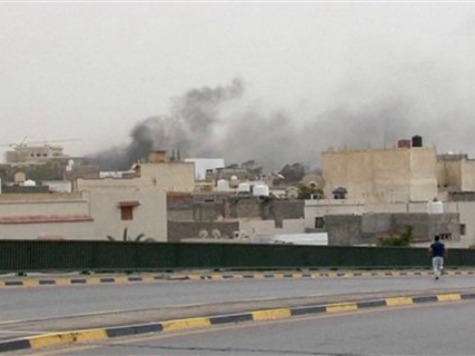Rebel forces led by General Khalifa Hafter attacked the Libyan parliament building in the capital city of Tripoli on May 18th, according to a Reuters interview of the general’s spokesman.
Residents confirmed heavy gunfire from anti-aircraft weapons and rocket-propelled grenades near the building. General Hafter was exiled by former Libyan dictator Gaddafi but returned in 2011, supposedly as “The CIA’s Man in Libya,” to become one of the top three rebel leaders during the Libyan Civil War. General Hafter’s attack on the parliament building appears to be in opposition to the election of Islamist Prime Minister Ahmad Mitig, who was backed by the Libyan Muslim Brotherhood’s political arm.
General Haftar’s spokesman said his forces had carried out the assault as part of his campaign to rid Libya of Islamist militants. “These are members of the Libyan National Army,” Mohamed al-Hejazi, spokesman for the group, said, using the name of the forces loyal to Haftar. The local television station al-Nabaa reported that fighting had also erupted in the southern half of Tripoli.
According to Stratfor Global Intelligence, earlier clashes began in Benghazi, Libya on May 16th left at least 70 dead. The fighting destroyed the May 12th agreement between the Libyan state-owned National Oil Corp. and various tribal and militia authorities to resume 150,000 barrels per day (bpd) of oil production and work towards ramping up production to 500,000 bpd in western Libya.
The latest dispute surrounds “the contentious May 4th election of Prime Minister Ahmad Mitig,” who was backed by the Justice and Construction Party, the political arm of the Libyan Muslim Brotherhood. “The movement can rely on support from powerful militia councils in Misrata, the original home of Mitig’s family, as well as Islamist-leaning militias such as Benghazi’s powerful February 17th Martyrs Brigade,” according to Stratfor.
General Haftar’s opposition to Mitig’s legitimacy is also being supported by the forces of Ibrahim Jadhran, whose armed blockade of Libya’s eastern oil terminals have caused the most damage to Libyan export capacity. Although Libya’s oil output has been cut to 200,000 bpd from 1.4 million bpd, Haftar and Jadhran’s demands for greater autonomy and share of the oil wealth are strongly opposed by the Misratans, Islamists and the Justice and Construction Party.
The author welcomes feedback and will respond to comments by readers.

COMMENTS
Please let us know if you're having issues with commenting.